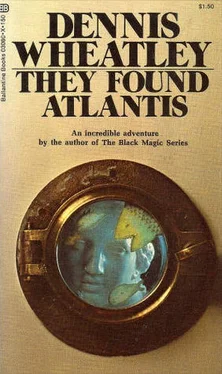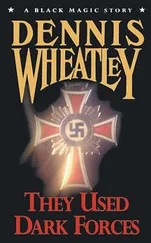Dennis Wheatley - They Found Atlantis
Здесь есть возможность читать онлайн «Dennis Wheatley - They Found Atlantis» весь текст электронной книги совершенно бесплатно (целиком полную версию без сокращений). В некоторых случаях можно слушать аудио, скачать через торрент в формате fb2 и присутствует краткое содержание. Жанр: Старинная литература, на английском языке. Описание произведения, (предисловие) а так же отзывы посетителей доступны на портале библиотеки ЛибКат.
- Название:They Found Atlantis
- Автор:
- Жанр:
- Год:неизвестен
- ISBN:нет данных
- Рейтинг книги:4 / 5. Голосов: 1
-
Избранное:Добавить в избранное
- Отзывы:
-
Ваша оценка:
- 80
- 1
- 2
- 3
- 4
- 5
They Found Atlantis: краткое содержание, описание и аннотация
Предлагаем к чтению аннотацию, описание, краткое содержание или предисловие (зависит от того, что написал сам автор книги «They Found Atlantis»). Если вы не нашли необходимую информацию о книге — напишите в комментариях, мы постараемся отыскать её.
Now, an incredible expedition is being prepared. Its destination: the final resting place of the ancient gold-encrusted city – one mile beneath the surface of the sea.
For the lovely Camilla and her band of adventurers the days to come are full of danger. Ahead lies the silence of the unknown Deeps – and a nightmare of terror and betrayal.
They Found Atlantis — читать онлайн бесплатно полную книгу (весь текст) целиком
Ниже представлен текст книги, разбитый по страницам. Система сохранения места последней прочитанной страницы, позволяет с удобством читать онлайн бесплатно книгу «They Found Atlantis», без необходимости каждый раз заново искать на чём Вы остановились. Поставьте закладку, и сможете в любой момент перейти на страницу, на которой закончили чтение.
Интервал:
Закладка:
'The country outside the capital is described as a level plain surrounded by mountains which descended towards the sea. Those to the north were very lofty and precipitous, but to the south the plain spread out through the centre of the land measuring at its broadest 3,000 stadia in one direction and 2,000 in the other, which is about 345 miles by 230. The whole region of the island was said to lie towards the south and be sheltered from the north.
'There were many villages in the mountains with rivers, lakes and meadows which supported them independently of the towns, and the great plain had been scientifically cultivated during many ages by many kings. The plain was entirely surrounded by a circular ditch and Plato says of this:
' "The length and width of this ditch was incredible, and gave the impression that such a work, in addition to so many other works, could hardly have been wrought by the hand of man. But I must say what I have heard."
'It was 100 feet deep, 220 feet wide and about 1,150 miles in length. It received the streams which came down from the mountains, wound round the plain, and was then let off into the sea. Smaller canals a hundred feet in width intersected the plain at intervals of a hundred stadia, roughly eleven and a half miles, and by these wood was brought down from the mountains to the city and the fruits of the earth were conveyed in ships from one place to another. Twice a year the crops were gathered since in winter they had the benefit of the rains and in the summer they were able to irrigate the whole plain by means of their canals.
'Plato goes on to say that for countless generations, as long as the divine nature lasted in them, the Atlanteans were obedient to the law, rejoicing in all the blessings that sacred island, lying beneath the sun, brought forth in such abundance, and that their wealth did not deprive them of their self control; but that the divine portion of their nature began to fade away by becoming diluted too often, so that human nature got the upper hand. They became base, corrupt and evil. Then the father of the gods wished to inflict punishment upon them that they might be chastened---
'Here to our great loss Plato's story abruptly ends and it is believed that he died before the completion of his manuscript.'
'It sounds almost too wonderful to have been true,' said Camilla doubtfully. 'Is all that you've told us in Plato's book?'
'Every point that I have touched upon,' the Doctor assured her with his little bow. 'Also many other marvellous descriptions. I have a copy here if you would care to verify.'
'No, no, Doctor, we'll take your word. Go on please do.'
'Very well then.' He sat forward with his pudgy hands 47
planted firmly on his fat knees. 'Consider please the following facts.
'How could Plato have invented a story correctly describing the opposite continent of America which he speaks of as surrounding the true ocean, meaning of course its semicircle from the Cape of St. John's, Newfoundland to the north eastern point of Brazil.
'Atlas's brother Gadeirus was given the extremity of the island towards the Straits of Gibraltar, which in Plato's time was still called the region of Gades. We still have a memory of this in the Spanish city of Cadiz. Moreover, it is a curious fact that the Basque people differ from all other European races. Their language, which has preserved its identity in this western corner of Europe between two mighty kingdoms, resembles in its grammatical structure no other language of the old world in any respect, but it has incontestable affinities with the aboriginal languages of America and those alone.
'The fruit, having a hard rind, affording drinks, flesh and ointment, which Plato speaks of, is obviously the cocoanut, and the existence of Atlantis and other islands could alone account for the migration of it, and countless other examples of semi-tropical flora from one continent to the other.
'In all the hundreds of systems of writing which have been evolved by different races all are based upon picture drawings with two exceptions only, these are the Phoenician alphabet and the Maya alphabet of Central America. Both of these are based upon the expression of vocal sounds by written signs. These correspond to such a remarkable degree that it is impossible to doubt their common origin.
'In view of that it is particularly interesting to note that when the Phoenicians founded their great colony at Carthage they constructed their harbour upon precisely the same principle as that which Plato tells us was the Atlantean plan used many thousands of years before. Both were inland and circular in formation, both had islands in their centre containing the most important buildings of the city. Moreover, we find that both peoples used covered docks for their shipping so that each harbour must have presented the appearance of a great ring of airship hangars right down on the waterline.
'Plato speaks of three kinds of stone being used in the construction of the Atlantean fortifications. In the Azores we find rocks red and white in colour and also great lumps of black lava. He also mentions hot springs and these too are abundant in the Azores.
'The metal termed by Plato "orichalcum" is undoubtedly pure red copper. The importance of the stress which is laid upon this metal is enormous. In both hemispheres we have ample evidence of a Bronze Age and in both, weapons end utensils formed from this compound of approximately nine parts copper and one part tin are almost identical in appearance. The tin is added to give hardness and durability, but it is inconceivable that this fact should have been discovered in both continents simultaneously The Bronze Age must have been preceded by a Copper Age of several thousand years during which men worked copper alone without the addition of tin.
'Where are the traces of this Copper Age? There is no evidence to be found of its existence in any portion of the known world. The explanation therefore is that it developed in Atlantis, and the barbarous peoples of the outer continents passed straight from Stone to Bronze upon the arrival of the cultured survivors from the Atlantean disaster.
'Just as the Arab countries today are passing straight from the horse to the aeroplane having entirely missed the era of roads and motor cars.' put in Count Axel.
'Exactly—you make my point Count,' the Doctor agreed with a throaty chuckle. 'Now, to proceed:
'In Plato's description of Poseidon's temple he tells us that the god was represented as standing in a chsrlot with six winged horses. In every representation of Neptune we see him thus. Why should the god of the sea always be pictured driving a chariot or mounted upon horseback? Because he was not, in fact, a sea king but a landsman, who ruled the great island in the centre of the ocean, the survivors of which filled all other peoples with awe because, when they came up out of the ocean, they had already achieved the domestication of the horse.
'Further, in connection with this domestication of wild animals. In all our history we have no evidence of fresh species of animals being tamed and made to serve human convenience. Such a development would take many thousands of years experiment and practice. Atlantis, safe in its island security from invasion by barbarians, alone supplies a satisfactory territory in which their tremendous work for humanity could have taken place.
'This also applies to the conversion of wild plants and grasses into cultivated flowers, orchards, and reapable crops. It is a singular fact, that despite their great range of species, we owe hardly a dozen useful plants to Australia, South Africa, America north of Mexico, New Zealand, or America, south of the River Plate. What is even more strange is, that of more than one third of our cultivated species we have no trace whatever of the wild originals. All our great cereals—wheat, oats, barley, rye and maize—must have been first domesticated in a vast antiquity or in some portion of the globe which has disappeared carrying many of their parent wild plants with it.
Читать дальшеИнтервал:
Закладка:
Похожие книги на «They Found Atlantis»
Представляем Вашему вниманию похожие книги на «They Found Atlantis» списком для выбора. Мы отобрали схожую по названию и смыслу литературу в надежде предоставить читателям больше вариантов отыскать новые, интересные, ещё непрочитанные произведения.
Обсуждение, отзывы о книге «They Found Atlantis» и просто собственные мнения читателей. Оставьте ваши комментарии, напишите, что Вы думаете о произведении, его смысле или главных героях. Укажите что конкретно понравилось, а что нет, и почему Вы так считаете.












